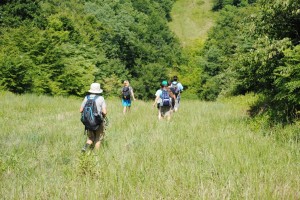
“Summer camp provides young people with productive and creative uses for their time by offering a valuable mix of both physical and intellectual activities.”
All work and no play makes Jack a dull boy. Unfortunately, the inverse isn’t much better. All play and no work makes for a pretty unproductive summer. In the late 1800s, one summer camp director, Henry W. Gibson characterized summer vacation as “a period of moral deterioration with most boys … who have heretofore wasted the glorious summer time loafing on the city streets, or as disastrously at summer hotels or amusements places.”1 That’s why parents have been sending their children to summer camp for as long summer camps have existed in America, which, according to researcher and author Abigail A. Van Slyck, is around the 1880s.2 Though the first camp for girls did not materialize until around 1900.
“First introduced to the North American landscape in the 1880s, camps were part of a back-to-nature trend that had been developing on both sides of the Atlantic since the middle of the 19th century.”
Summer camps were designed as a way to maximize summer vacation and take learning out of the classroom. “The environment and activities at camp incorporate all of the elements of healthy youth development,” according to a study conducted by Harris Interactive.3
Why is Summer Camp Beneficial?
“Summer camp provides young people with productive and creative uses for their time by offering a valuable mix of both physical and intellectual activities,“ explains Harris Interactive.
Intellectual Advancement
The National Summer Learning Association (NSLA) reports that most students lose about two months of grade level equivalency in mathematical computation skills over the summer months.
“Summer camps, we discovered, are perfect places to help children optimize their psychosocial development,” writes researcher Michael Ungar.4 Children not only learn survival and nature skills, such as how to build a fire or how to identify plants and animals, but they also learn how to problem solve, work as a team, think outside the box, and keep their minds sharp.
Exercise
In recent years, summer vacation has transformed into a three-month adventure and become three months of sitting on the couch and playing video games. Summer camps help get children up, moving, and exercising.
“At camp kids get what they need to develop physically,” says Ungar. “Ideally, fresh air, exercise, a balance between routine and unstructured time, and all the good food their bodies need.”
Instead of sitting down and watching TV or sitting down and playing video games, your child will spend the summer (or at least a week of it) running, swimming, jumping, hiking, climbing, and having an adventure.
Teamwork and Leadership
Teamwork is a skill. It’s not something we are all born with, but it is an important skill to learn, develop, and nurture. Teamwork is important throughout life, from youth sports to the office.
“Summer camp helps to build young people’s leadership skills, confidence, and self-esteem,” writes Harris Interactive. “Summer camp helps young people to become more socially adept by offering them opportunities to participate in and contribute to team – building activities.”
Self Worth
In an age where cyber-bullying is at an all-time high, children’s self worth is at an alltime low. Summer camp is designed to help children discover their hidden talents and blossom in a judgement-free zone.
“Your child may not be the best on the ropes course, the fastest swimmer, or the next teen idol when he sings, but chances are that a good camp counselor is going to help your child find something to be proud of that he can do well,” says Ungar.
“Summer camp helps to instill a positive sense of self-worth and usefulness in young people by providing them with service opportunities, as well as positive peer-to-peer and intergenerational communications,” adds Harris Interactive
Build Friendships
Finally, summer camp is a great way to meet new people and develop new friendships. It is important for children to get up, get moving, and socialize with other children their age.
“Summer camp builds caring and nurturing relationships by engaging young people in group activities with both peers and adults,” explains Harris Interactive.
Fun & Exciting Summer Camps in Savage Mill, Maryland
Terrapin Adventures, conveniently located in Howard County, Maryland, between Baltimore and Washington DC, offers three fun and exciting summer camp experiencesfor children 8-15 years of age designed to challenge your children physically and intellectually. We maintain a ratio of one Camp Counselor for every six campers, providing encouragement, support and a helping hand when needed.
Give your child a new experience that they’ll remember for years to come.
Click Here to Sign Up!
We know you are a busy parent, which is why Terrapin Adventures offers pre- and post-care for an additional fee. This allows you to drop off or pick up your child without having to worry about getting to work late or leaving early.
If you have any questions, please call Terrapin Adventure at 301.725.1313, or email us at info@terrapinadventures.com to learn more.
Works Cited
- Symonds, Dominic. We’ll Have Manhattan: The Early Work of Rodgers and Hart. New York, NY: Oxford U, 2015. Print.
- Ayres, Van Slyck Abigail. A Manufactured Wilderness: Summer Camps and the Shaping of American Youth, 1890-1960. Minneapolis: U of Minnesota, 2006. Print.
- Boy Scouts of America: Summer Camps Outcome Study A study conducted by Harris Interactive
- Ungar, Michael. “Summer Camps Make Kids Resilient.” Psychology Today (2012). Web.
